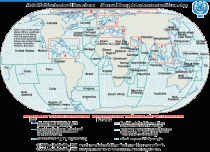15 April 2014
SHARES News Items Overview: 16 March 2014-15 April 2014
This is our News Items Overview of 16 March 2014-15 April 2014, a summary of recent news relating to shared responsibility. (more…)
15 April 2014
This is our News Items Overview of 16 March 2014-15 April 2014, a summary of recent news relating to shared responsibility. (more…)
7 April 2014

Neptune, Global Maritime Search and Rescue Areas map, at www.neptune-scuba.info/sarmap-en.html
With Malaysia Airlines Flight MH370 being officially declared lost at sea, and as the international search efforts hone in on the location of the aircraft, it is time to asses not only what this teaches us about aviation safety, but also the consequences of shared responsibility for international search and rescue operations.
Malaysia Airlines Flight MH370 went missing on the 8th March, losing communication around an hour after taking off from Kuala Lumpur on route to Beijing. The fact that the airplane was missing for a number of hours, and that its communication devices were mostly switched off, meant that from the outset it was unclear where it might have come down, if indeed it had come down at all. The initial suggestions were that the plane was off the coast of Vietnam, or further out in the China Sea. This was followed by information that it had made a sharp turn towards the Straight of Malacca, and thereafter might have followed either a broad northern or southern corridor. (more…)
3 April 2014
The exchange of information between Dutch intelligence services and the United States National Security Agency (NSA) is no longer taking place entirely outside the public eye. After a graph published in German news magazine Der Spiegel in August 2013 initially seemed to suggest that the NSA had intercepted 1.8 million records of metadata from Dutch phone calls in the period of December 2012 to January 2013, it became clear this February that Dutch intelligence services had gathered these records themselves, and had subsequently shared them with the NSA. This information consisted of metadata records gathered in the context of anti-terrorism and military operations abroad.
A substantial share of Dutch intelligence efforts is directed towards Somalia, and millions of Somali phone calls have been intercepted from both the Dutch town of Burum and Dutch navy ship HMS Rotterdam. The Netherlands has been collecting this information in order to support the Dutch contribution to the navy missions combating piracy in the Gulf of Aden. The (meta)data is shared with the NSA (who do not have access to Somali telephone traffic) and in return the US has provided the Netherlands with technical support needed to intercept local telephone traffic from the HMS Rotterdam.[1] (more…)